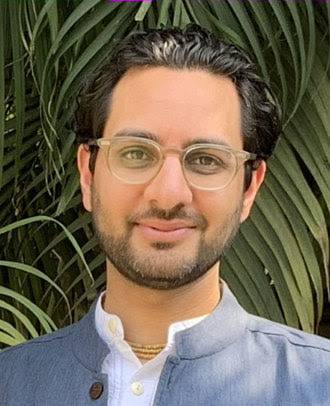Interfaith Insight - 2021
Permanent link for "Bringing multiple religious perspectives to the healing of our Earth" by Kyle Kooyers on April 13, 2021
At its core, interfaith cooperation implies a willingness to work together across differences of belief or worldview. That's no surprise. But equally as important is the maintenance of distinctiveness – what makes us different - even as we come together to undertake that work.
While it's wonderful to celebrate our "oneness" as we do food drives together, build houses together, support vulnerable populations together, and seek justice together, what really makes that work special is multiplicity of beliefs and imperatives that prompt us to those shared spaces and efforts. By wading into and honoring difference, the cooperation becomes even richer.
As one Hindu voice and recognized global leader in the religious environmental movement points out, this honoring of imperative and action is just as important in our collective work of healing our Earth.
Gopal Patel is the co-founder and director of Bhumi Global, a nonprofit organization that works to educate and mobilize Hindu communities globally for environmental action, and currently serves as an adviser on religion and sustainable development to the United Nations.
In his article, “Hindu Worldviews and the Religious-Environmental Movement,” co-authored with Mat McDermott, Patel makes clear that interfaith engagement is necessary to address environmental concerns, notably the climate crisis. Yet, he also names the difficulties of acknowledging and respecting the different beliefs and convictions that bring diverse peoples into multifaith spaces.
First and foremost, this involves having to navigate assumptions around language and theology that become another barrier to inclusion in the interfaith environmental movement. For Patel, as well as for others in the dharmic traditions, the entire world is seen as an interconnected natural system. This view is seen in contrast with more Western and Abrahamic views that tend to see the world in terms of contrasts, even of good versus evil.
He relates an event in Rome for multifaith environmental leadership training that involved 100 faith leaders from all over the world. During a procession through central Rome, many posters and banners were displayed. One such banner said, “Fossil fuels are from hell. Solar power is from the heavens.” The Hindu participants were bothered by this severe dichotomy that did not recognize “that here are always shades of grey, that good and bad are only seen as such in accordance with time, place, and circumstance,” Patel writes. “Hindu theology does set up polarities in descriptions of particular actions — harming versus non-harming, ignorance versus insight, suffering versus non-suffering, for example — but these still are shades of grey conditioned by circumstance. The absoluteness of terms good and evil rarely if ever enter into a Hindu understanding of existence.” Likewise, the idea of an eternal heaven or hell is a Western Abrahamic concept that makes no sense in Hindu theology.
While efforts for addressing global environmental issues require global involvement from all religious traditions, it is also important to be aware of the differing concepts and theological ideas that are brought to the discussion and approaches to action. Patel describes it as a “yes, but…” translation of Abrahamic terms. He writes, we are “internally acknowledging our differences in worldview but choosing to not speak up out of recognition of a shared desire to see similar solutions implemented.”
For Patel, despite these hurdles, Hindus ought to enter the hard work of pluralism and dialogue, remaining true to the beliefs and imperatives of their tradition while also conveying to non-Hindus the relevance of those worldview convictions as they are incredibly valuable to the work.
He writes, "As humans start to come to terms with how our contemporary lives overburden our shared planet, Hinduism (standing alongside Buddhism, Jainism, and Sikhism) offers ways of understanding the interrelationship of all life, comprehending our place in the cosmos in a way that is uniquely suited to our current predicament, as well as guidance on how we each might live with more compassion for our fellow creatures."
When it comes to catalyzing action, Hinduism offers compelling imperatives for engaging in environmental work. Patel writes of his tradition, "Its emphasis on the interrelationship of all beings operating within a natural order, individualized paths combined with a focus on community and the common good, the pluralism of practice, and the ideal of minimizing the harm of one’s actions are exactly the messages the world needs to hear if we are to rise to the task of transforming our global society into one living within the ecological limits of Earth.”
Speaking to the Abrahamic traditions, Gopal Patel exhorts them to hold space for Hindu voices and views. Even in the context of the Western world, where Abrahamic traditions are in the majority, Hindus can offer differing views that enrich and augment the environmental conversation and work.
Gopal Patel will be featured at the upcoming Grand Dialogue in Science and Religion: Healing Our Earth. He will join other multifaith leaders in a discussion on “Interfaith Imperatives for Climate Action.” This event will be held virtually at 2 p.m. on Sunday, April 18.
The webinar will explore how faith or values from various traditions prompt action towards addressing our climate crisis, offering two dialogue panels in which individuals share with one another motivations and approaches for this necessary work. Panelists will offer wisdom out of their traditions and work around climate change with strategies for solidarity, adaptation, and mitigation. We will hear voices from the Hindu, Jewish, Muslim, Buddhist, Native American, secular, and Christian traditions.
Recognizing that we all come from very different traditions, communities, and experiences, may we strive to respect the distinctiveness of our worldviews and convictions, even as we enter the urgent work of seeking healing for our Earth together.


